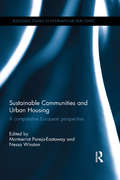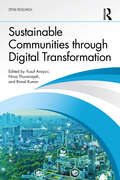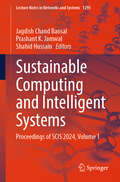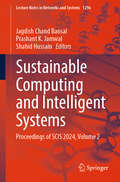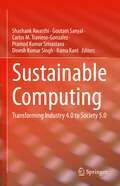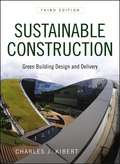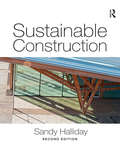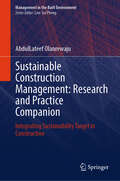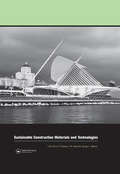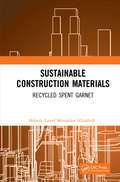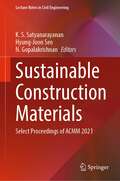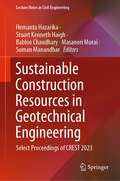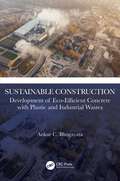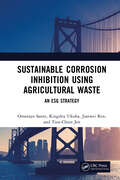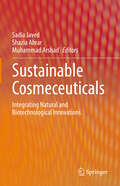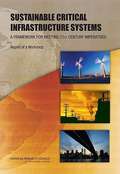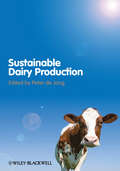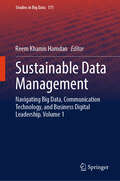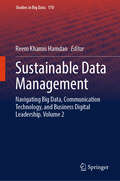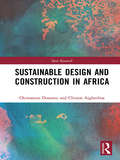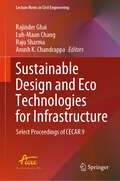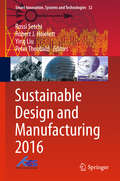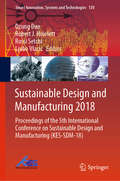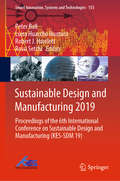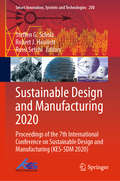- Table View
- List View
Sustainable Communities and Urban Housing: A Comparative European Perspective (Routledge Studies in International Real Estate)
by Montserrat Pareja-Eastaway and Nessa WinstonSince the start of the twenty-first century, urban communities have faced increasing challenges in housing affordability, with environmental issues causing additional concern. It is clear that changes to urban housing are needed to enhance the resilience of cities and improve the economic, social and physical well-being of residents. This book provides a comparative cross-national perspective on urban housing and sustainability in Europe, exploring the key barriers and drivers associated with sustainable urban development and community regeneration. Country-specific chapters allow for easy comparison, with each summarizing how sustainable housing operates in the country in question, before going on to discuss the key barriers and drivers at play. This book brings a sustainability perspective to the comparative housing literature which frequently fails to integrate the social, economic and environmental pillars of sustainability. The book outlines many of the changes that professionals and residents will need to make to their practices and cultures in order to enhance housing resilience. Students, researchers and professionals with an interest in sustainable housing creation and regeneration will find this book an invaluable reference.
Sustainable Communities through Digital Transformation (Spon Research)
by Yusuf Arayici Niraj Thurairajah Bimal KumarThis book brings together cutting-edge exploratory research findings to show how a vision for sustainable communities can be enabled by digital transformation. It attempts to apply existing knowledge about digital transformation and sustainable communities and compare, interpret, diagnose, and evaluate a variety of digital solutions to ascertain their suitability for the delivery of a more sustainable built environment. Chapters examine a breadth of issues including how digital transformations could: Provide digital/physical working/living environments that anticipate emerging lifestyles Blend digital engagements into the physical engagements within the built environment Support business and social activity in physical and online venues Use advanced information and community-oriented technologies for efficient management of urban services Promote sustainability Express narratives that celebrate the experience of place and community Leverage transformation of educational systems Foster linkages between universities, and between universities and businesses Facilitate working relationships among small and large companies Foster new processes and arrangements for innovation in the built environment By comparing the key principles of digital transformation with those of sustainable communities, the contributors seek to justify or discount the applicability of digital change for achieving more sustainable communities. The research presented in this book is essential reading for architecture, urban planning, quantity surveying, building surveying, real estate, and construction management professionals and academics.
Sustainable Computing and Intelligent Systems: Proceedings of SCIS 2024, Volume 1 (Lecture Notes in Networks and Systems #1295)
by Jagdish Chand Bansal Shahid Hussain Prashant K. JamwalThis book presents selected papers from International Conference on Sustainable Computing and Intelligent Systems (SCIS 2024), held on 9–10 September 2024, in University of Canberra, Bruce, Australia. The topics covered in the book are green computing, renewable energy integration, sustainable urban computing, IoT and sustainability, sustainable IoT applications, data analytics for sustainability, internet of things, information security, embedded systems, real-time systems, cloud computing, big data analysis, quantum computing, automation systems, intelligent IoT eHealth, bio-inspired intelligence, brain modeling and simulation, cognitive systems, cyber-physical systems, data analytics, data/web mining, data science, hybrid systems and intelligence for security.
Sustainable Computing and Intelligent Systems: Proceedings of SCIS 2024, Volume 2 (Lecture Notes in Networks and Systems #1296)
by Jagdish Chand Bansal Shahid Hussain Prashant K. JamwalThis book presents selected papers from International Conference on Sustainable Computing and Intelligent Systems (SCIS 2024), held on 9–10 September 2024, in University of Canberra, Bruce, Australia. The topics covered in the book are green computing, renewable energy integration, sustainable urban computing, IoT and sustainability, sustainable IoT applications, data analytics for sustainability, internet of things, information security, embedded systems, real-time systems, cloud computing, big data analysis, quantum computing, automation systems, intelligent IoT eHealth, bio-inspired intelligence, brain modeling and simulation, cognitive systems, cyber-physical systems, data analytics, data/web mining, data science, hybrid systems and intelligence for security.
Sustainable Computing: Transforming Industry 4.0 to Society 5.0
by Dinesh Kumar Singh Carlos M. Travieso-Gonzalez Goutam Sanyal Shashank Awasthi Pramod Kumar Srivastava Rama KantThis book presents recent advancements in Industry 4.0 and addresses how these can be useful in achieving sustainable solutions in Society 5.0. The book also serves as a reference for developing sustainable engineering solutions to various socio-economic and techno-commercial issues. The book is meticulously structured into two sections: Section I sheds light on fundamentals, nitty-gritties, and principles of technological innovations and advancement in artificial intelligence, cloud computing, industrial Internet of Things (IIOT), and Society 5.0, whereas Section II covers viable engineering solutions developments for revamping Industry 4.0 to Society 5.0. Overall, the authors aim to show how technological advancements can be used to address social issues and improve society.
Sustainable Construction
by Charles J. KibertThe classic reference for high-performance green building delivery systems No longer just a buzzword, sustainable construction is going mainstream-and soon will be the norm. Revised to reflect the latest developments of the U. S. Green Building Council's Leadership in Energy and Environmental Design (LEED) rating system and other tools, Sustainable Construction: Green Building Design and Delivery, Third Edition guides construction and design professionals through the process of developing commercial and institutional high-performance green buildings in today's marketplace. Charles Kibert provides an introduction to green building, covering the theory, history, and state of the industry as well as best practices in building procurement and delivery systems. From green building and Green Globes assessments to building hydrological systems and materials and product selection, this comprehensive text covers all of the factors involved with sustainable construction. In a clear and accessible writing style, Kibert addresses issues so that the reader can think critically and independently as part of the cutting edge in green building. The Third Edition includes up-to-date coverage of: The latest developments leading up to LEED version 4 Carbon neutral design and carbon accounting Green Globes and international building assessment systems The Living Building Challenge Environmental product declarations (EPDs) as the norm for green building products The trends in net-zero energy building design and policies Broad enough to cover the needs of faculty and students and detailed enough to serve as a professional reference, Sustainable Construction, Third Edition is a must for the builder/owner and construction manager looking to take advantage of the opportunities in this rapidly evolving field, the designer looking to be LEED certified, or anyone interested in sustainability.
Sustainable Construction
by Sandy HallidayThe second edition of Sustainable Construction provides a masterclass on the principles and techniques involved in the design and delivery of practical, affordable, high quality sustainable buildings and places. It presents precedents, theory, concepts and principles alongside 120 wide ranging case studies that highlight current best practice and encourage implementation. Topics in the book include: • the history of ideas in sustainable construction • policy • materials • cost issues • appraisal techniques • environmental design • energy • water • construction processes • and urban ecology. The book is heavily illustrated in full colour and is an ideal, contemporary, accessible primer to courses in Architecture, Construction, Building Engineering, Environmental Engineering, Project Management, Landscape, Urbanism and Development.
Sustainable Construction Management: Integrating Sustainability Target in Construction (Management in the Built Environment)
by AbdulLateef OlanrewajuThis book provides a centralized source of information on specific sustainable construction management strategies, practices, and principles. It compiles pertinent information on sustainable construction management into a single, easily accessible document together with guidelines, procedures, and best practices. Without having to examine several sources, users may easily access the information they require for sustainable construction management. This book blatantly seeks to standardize procedures, enable onboarding and training, guarantee compliance, offer reference and troubleshooting assistance, encourage openness and communication, and promote ongoing process and organizational improvement. The book contains practical insights and trends drawing from empirical conclusions that are derived from data collected from experts and practitioners in the construction sector. Potential readers could include instructors at tertiary institutions, students (both research, graduate, and undergraduate students) as well as policy-makers from the relevant authorities who seek to better understand sustainability in the built environment.
Sustainable Construction Materials and Technologies: Proceedings of the Conference on Sustainable Construction Materials and Technologies, 11-13 June 2007, Coventry, United Kingdom
by Yoon-moon Chun; Peter Claisse; Tarun R. Naik; Eshmaiel GanjianThe construction materials industry is a major user of the world’s resources. While enormous progress has been made towards sustainability, the scope and opportunities for improvements are significant. To further the effort for sustainable development, a conference on Sustainable Construction Materials and Technologies was held at Coventry University, Coventry, U.K., from June 11th - 13th, 2007, to highlight case studies and research on new and innovative ways of achieving sustainability of construction materials and technologies. This book presents selected, important contributions made at the conference. Over 190 papers from over 45 countries were accepted for presentation at the conference, of which approximately 100 selected papers are published in this book. The rest of the papers are published in two supplementary books. Topics covered in this book include: sustainable alternatives to natural sand, stone, and Portland cement in concrete; sustainable use of recyclable resources such as fly ash, ground municipal waste slag, pozzolan, rice-husk ash, silica fume, gypsum plasterboard (drywall), and lime in construction; sustainable mortar, concrete, bricks, blocks, and backfill; the economics and environmental impact of sustainable materials and structures; use of construction and demolition wastes, and organic materials (straw bale, hemp, etc.) in construction; sustainable use of soil, timber, and wood products; and related sustainable construction and rehabilitation technologies.
Sustainable Construction Materials: Recycled Spent Garnet
by Habeeb Muttashar AlzuabidiRapid industrial growth has witnessed the ever-increasing utilization of sand from rivers for various construction purposes, which has caused disruption to natural ecosystems. Sustainable Construction Materials: Recycled Spent Garnet presents an investigation into the capacity for these minerals to serve as a sand replacement and as a viable, sustainable construction material to help mitigate the current rate of exploitation of river sand. Features: Presents the effects of spent garnet on the fresh and hardened characteristics of self-compacting geopolymer concrete in terms of workability and mechanical strength. Examines spent garnet with regard to concrete durability in response to carbonation, as well as sulphate and acid attack. Includes a comprehensive review of the existing literature in the field, including past developments in self-compacting geopolymer concrete, as well as the ongoing activities in the field of spent garnet-based concrete production.
Sustainable Construction Materials: Select Proceedings of ACMM 2021 (Lecture Notes in Civil Engineering #194)
by K. S. Satyanarayanan Hyung-Joon Seo N. GopalakrishnanThis book presents the select proceedings of the International Conference on Advances in Construction Materials and Management (ACMM 2021). It discusses the recent innovations towards construction management, building technology and new materials in practice in civil engineering. Various topics covered include architecture and urban planning, smart materials and structures, GIS in construction application, transportation materials and engineering, geotechnical applications in construction, energy and sustainability, green building technologies and materials and construction management. The book will be useful for beginners, researchers and professionals working in the area of civil engineering.
Sustainable Construction Resources in Geotechnical Engineering: Select Proceedings of CREST 2023 (Lecture Notes in Civil Engineering #448)
by Hemanta Hazarika Stuart Kenneth Haigh Babloo Chaudhary Masanori Murai Suman ManandharThis book presents select proceedings of the 2nd International Conference on Construction Resources for Environmentally Sustainable Technologies (CREST 2023), and focuses on sustainability, promotion of new ideas and innovations in design, construction and maintenance of geotechnical structures with the aim of contributing towards climate change adaptation and disaster resiliency to meet the UN Sustainable Development Goals (SDGs). It presents latest research, information, technological advancement, practical challenges encountered, and solutions adopted in the field of geotechnical engineering for sustainable infrastructure towards climate change adaptation. This volume will be of interest to those in academia and industry alike.
Sustainable Construction: Development of Eco-Efficient Concrete with Plastic and Industrial Wastes
by Ankur C. BhogayataThis book focuses on the utilization of wastes produced from plastic usage by industry and consumers, along with the partial to full replacement of conventional cement as a primary binder material in concrete. This book demonstrates how to use post-consumer waste plastics and industry wastes from thermal power stations, agro-industries, and metal industries with a scientific approach to conventional concrete. The primary aim is to demonstrate the methods to prepare a sustainable alternative construction material of concrete using waste materials. Features: Illustrates making eco-friendly procedures of concrete construction popular by way of utilization of plastics and industrial wastes Covers all major aspects of plastic waste-based concrete from conception to execution Promotes alternative materials for sustainable construction Describes economic aspects of using eco-efficient concrete on a mass scale Includes experimental results with graphs This book is aimed at researchers and graduate students in civil engineering, construction materials, and concrete.
Sustainable Corrosion Inhibition Using Agricultural Waste: An ESG Strategy
by Tien-Chien Jen Kingsley Ukoba Omotayo Sanni Jianwei RenThis book discusses corrosion and inhibition using agricultural waste including the impact of corrosion on key emerging technologies such as 3D printing, clean energy, smart coating, and machine learning via environment, sustainability, and governance and economies (ESG) approach. The advantages and disadvantages of using this ecofriendly, sustainable natural product as a corrosion inhibitor over other commercially available corrosion inhibitors is discussed.Features: Discusses the concept of Industry 4.0 in corrosion inhibition technology. Explains how agricultural wastes are used in solving global corrosion challenges that aim to demystify machine learning, artificial intelligence, and waste to wealth, in different industries. Reviews in-depth inhibitor application in solving global challenges of housing, transport, oil and gas, among others. Explores impact of corrosion on the environment, sustainability, and governance and economies. Examines corrosion and 3D printing focusing on history, materials, manufacturers, and trends. The book is aimed at researchers and graduate students in corrosion, materials science, and waste processing.
Sustainable Cosmeceuticals: Integrating Natural and Biotechnological Innovations
by Muhammad Arshad Sadia Javed Shazia AbrarThis book explores eco-cosmeceuticals and offers a comprehensive overview of the latest sustainable and environmentally friendly innovations in cosmetic science. The book also addresses the pressing need for sustainable development in the beauty industry, aligning with global Sustainable Development Goals (SDGs). In this book, through scientific research and practical applications, readers will gain insights into how natural and eco-friendly ingredients are revolutionizing skincare and cosmetic products. Divided into 3 main parts, the chapters cover a wide array of topics, including the role of herbal extracts in achieving SDGs, sustainable cosmeceuticals using natural colorants from plants, and the potential of zooceuticals derived from animals. Readers will also discover groundbreaking research on cosmetics sourced from marine algae and mushrooms, as well as green biotechnological applications in aesthetic medicine. The book closes with a section dedicated to future trends and challenges, exploring cutting-edge technologies such as gene array technology and nanotechnology in skincare, while addressing critical issues like microbiological safety and cosmeceutical legislation, and providing a Life Cycle Assessment perspective in eco-cosmeceuticals. Given its breadth, this book is an essential resource for researchers, scholars, and practitioners in the fields of cosmetic science, biotechnology, and environmental sustainability. It invites readers to consider how these innovations can transform the future of beauty products, and it is particularly valuable for those interested in integrating eco-friendly practices into their work or studies.
Sustainable Critical Infrastruture Systems: A Framework for Meeting 21st Century Imperatives - Report of a Workshop
by National Research Council of the National AcademiesFor the people of the United States, the 20th century was one of unprecedented population growth, economic development, and improved quality of life. The critical infrastructure systems-water, wastewater, power, transportation, and telecommunications-built in the 20th century have become so much a part of modern life that they are taken for granted. By 2030, 60 million more Americans will expect these systems to deliver essential services. Large segments and components of the nation's critical infrastructure systems are now 50 to 100 years old, and their performance and condition are deteriorating. Improvements are clearly necessary. However, approaching infrastructure renewal by continuing to use the same processes, practices, technologies, and materials that were developed in the 20th century will likely yield the same results: increasing instances of service disruptions, higher operating and repair costs, and the possibility of catastrophic, cascading failures. If the nation is to meet some of the important challenges of the 21st century, a new paradigm for the renewal of critical infrastructure systems is needed. This book discusses the essential components of this new paradigm, and outlines a framework to ensure that ongoing activities, knowledge, and technologies can be aligned and leveraged to help meet multiple national objectives.
Sustainable Dairy Production
by Peter De JongThis book offers a comprehensive overview of the state of the art in sustainable dairy production, helping the industry to develop more sustainable dairy products, through new technologies, implementing life cycle analysis, and upgrading and optimization of their current production lines. It aims to stimulate process innovations, taking into account environmental, economic and public relations benefits for companies. Topics covered include: How to set up a sustainable production line How to quantify the carbon foot print of a dairy product by using life cycle analysis Current technologies to improve the carbon foot print What measures can be taken to reduce the global warming potential of the farm Reduction of water use in dairy production Marketing sustainable dairy products Bench marking of dairy products against other food products Potential future technological developments to improve the carbon foot print for the following decades
Sustainable Data Management: Navigating Big Data, Communication Technology, and Business Digital Leadership. Volume 1 (Studies in Big Data #171)
by Reem Khamis HamdanThis book dives into a new world of data and technology with the groundbreaking Sustainable Data Management, immerses readers in the realm of big data, and explores how digital technology can revolutionize business leadership. Discover how this book can guide readers through the deep waters of sustainable and efficient data management.
Sustainable Data Management: Navigating Big Data, Communication Technology, and Business Digital Leadership. Volume 2 (Studies in Big Data #170)
by Reem Khamis HamdanThis book dives deeper into the dynamic world of data and technology with the Sustainable Data Management and explores advanced strategies and innovative approaches to harnessing big data, leveraging communication technology, and mastering digital leadership in today's evolving business landscape. Uncover insights and techniques that propel readers organization towards sustainable success in the digital age.
Sustainable Design and Construction in Africa: A System Dynamics Approach (Spon Research)
by Clinton Aigbavboa Oluwaseun DosumuThis book addresses some of the countless challenges faced by developing countries when adopting sustainable design and construction and offers suggestions for the way forward for African development projects. The authors argue that the pervasive non-consideration of the interrelationship between the elements of sustainable design and construction is the reason for the current failures in sustainable design and construction in developed countries. By treating sustainability as a complex system, the authors provide the missing link between the design and construction of projects in a sustainable way with a view to improving industry and project performance. In doing so the book posits the need for improved sustainability practice in developing countries, lessons for developing countries from the successes and failures of sustainability adoption by developed nations, factors influencing adoption of sustainability and effects of sustainable designs and construction on productivity, human health and the environment at large. This book will be of interest to construction researchers, practitioners, professional bodies, housing policy makers and government institutions as well as training and funding providers in these areas.
Sustainable Design and Eco Technologies for Infrastructure: Select Proceedings of CECAR 9 (Lecture Notes in Civil Engineering #441)
by Rajinder Ghai Luh-Maan Chang Raju Sharma Anush K. ChandrappaThis book presents the select proceedings of Civil Engineering Conference in the Asian Region (CECAR 9) hosted by the ICE (I) under the aegis of ACECC at Goa, India, from 21-23 September, 2022. It presents innovations and recent trends in civil engineering technologies, research and infrastructural developments and facilitates new ideas in the field of infrastructure design and construction. Various topics covered include innovative infrastructure, design practice and construction technology for sustainability, infrastructure development for smart and sustainable cities and affordable housing for developing economies, new construction materials and sustainability of infrastructure, geotechnical management, operation and safety, eco technology in pavement design and construction of roads and airport. This book will be useful for students, researchers and professionals working in the area of civil engineering.
Sustainable Design and Manufacturing 2016
by Robert J. Howlett Rossi Setchi Ying Liu Peter TheobaldThis volumes consists of 59 peer-reviewed papers, presented at the International Conference on Sustainable Design and Manufacturing (SDM-16) held in Chania, Crete Greece in April 2016. Leading-edge research into sustainable design and manufacturing aims to enable the manufacturing industry to grow by adopting more advanced technologies, and at the same time improve its sustainability by reducing its environmental impact. SDM-16 covers a wide range of topics from sustainable product design and service innovation, sustainable process and technology for the manufacturing of sustainable products, sustainable manufacturing systems and enterprises, decision support for sustainability, and the study of societal impact of sustainability including research for circular economy. Application areas are wide and varied. The book will provide an excellent overview of the latest research and development in the area of Sustainable Design and Manufacturing.
Sustainable Design and Manufacturing 2018: Proceedings of the 5th International Conference on Sustainable Design and Manufacturing (KES-SDM-18) (Smart Innovation, Systems and Technologies #130)
by Robert J. Howlett Rossi Setchi Ljubo Vlacic Dzung DaoThis book gathers papers presented at the 5th International Conference on Sustainable Design and Manufacturing (SDM-18), held in Gold Coast, Australia in June 2018. The conference covered a wide range of topics, including: sustainable product design and service innovation, sustainable processes and technology for the manufacturing of sustainable products, sustainable manufacturing systems and enterprises, decision support for sustainability, and the study of the societal impact of sustainability including research on the circular economy. The corresponding application areas are wide and varied. The aim of cutting-edge research into sustainable design and manufacturing is to enable the manufacturing industry to grow by adopting more advanced technologies, and at the same time improve its sustainability by reducing its environmental impact. With these goals in mind, the book provides an excellent overview of the latest research and development in the area of Sustainable Design and Manufacturing.
Sustainable Design and Manufacturing 2019: Proceedings of the 6th International Conference on Sustainable Design and Manufacturing (KES-SDM 19) (Smart Innovation, Systems and Technologies #155)
by Robert J. Howlett Rossi Setchi Peter Ball Luisa Huaccho HuatucoThis volume consists of 52 peer-reviewed papers, presented at the International Conference on Sustainable Design and Manufacturing (SDM-19) held in Budapest, Hungary in July 2019. Leading-edge research into sustainable design and manufacturing aims to enable the manufacturing industry to grow by adopting more advanced technologies, and at the same time improve its sustainability by reducing its environmental impact. The topic includes the sustainable design of products and services; the sustainable manufacturing of all products; energy efficiency in manufacturing; innovation for eco-design; circular economy; industry 4.0; industrial metabolism; automotive and transportation systems. Application areas are wide and varied. The book will provide an excellent overview of the latest developments in the Sustainable Design and Manufacturing Area.
Sustainable Design and Manufacturing 2020: Proceedings of the 7th International Conference on Sustainable Design and Manufacturing (KES-SDM 2020) (Smart Innovation, Systems and Technologies #200)
by Robert J. Howlett Rossi Setchi Steffen G. ScholzThis book consists of peer-reviewed papers, presented at the International Conference on Sustainable Design and Manufacturing (SDM 2020). Leading-edge research into sustainable design and manufacturing aims to enable the manufacturing industry to grow by adopting more advanced technologies and at the same time improve its sustainability by reducing its environmental impact. Relevant themes and topics include sustainable design, innovation and services; sustainable manufacturing processes and technology; sustainable manufacturing systems and enterprises; and decision support for sustainability. Application areas are wide and varied. The book provides an excellent overview of the latest developments in the sustainable design and manufacturing areas.
